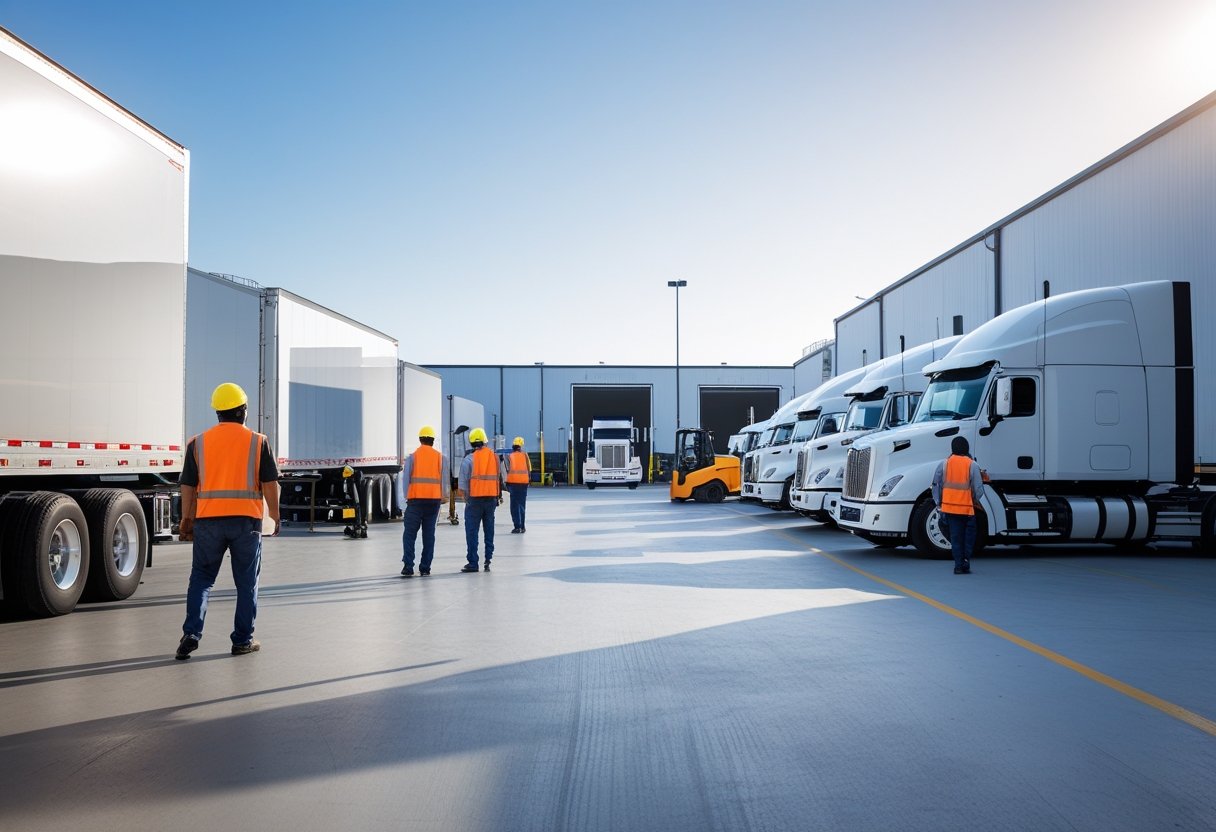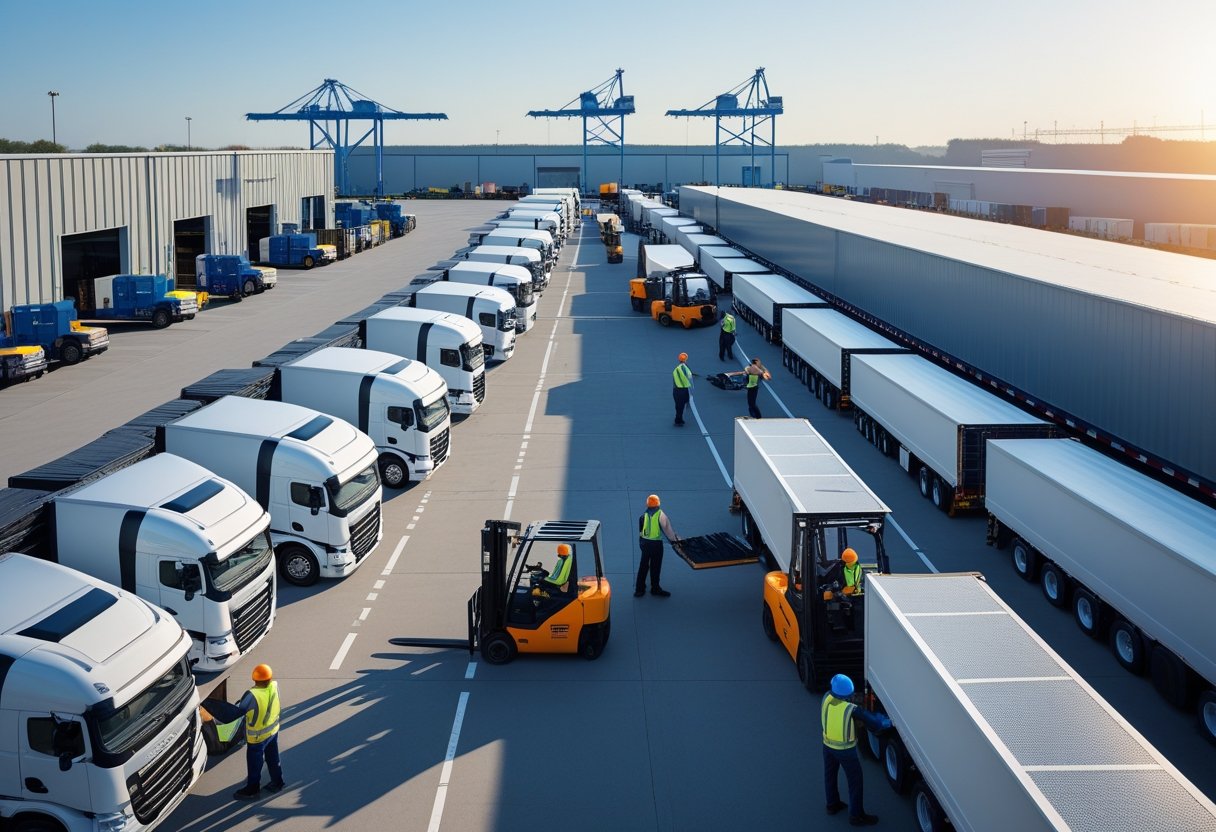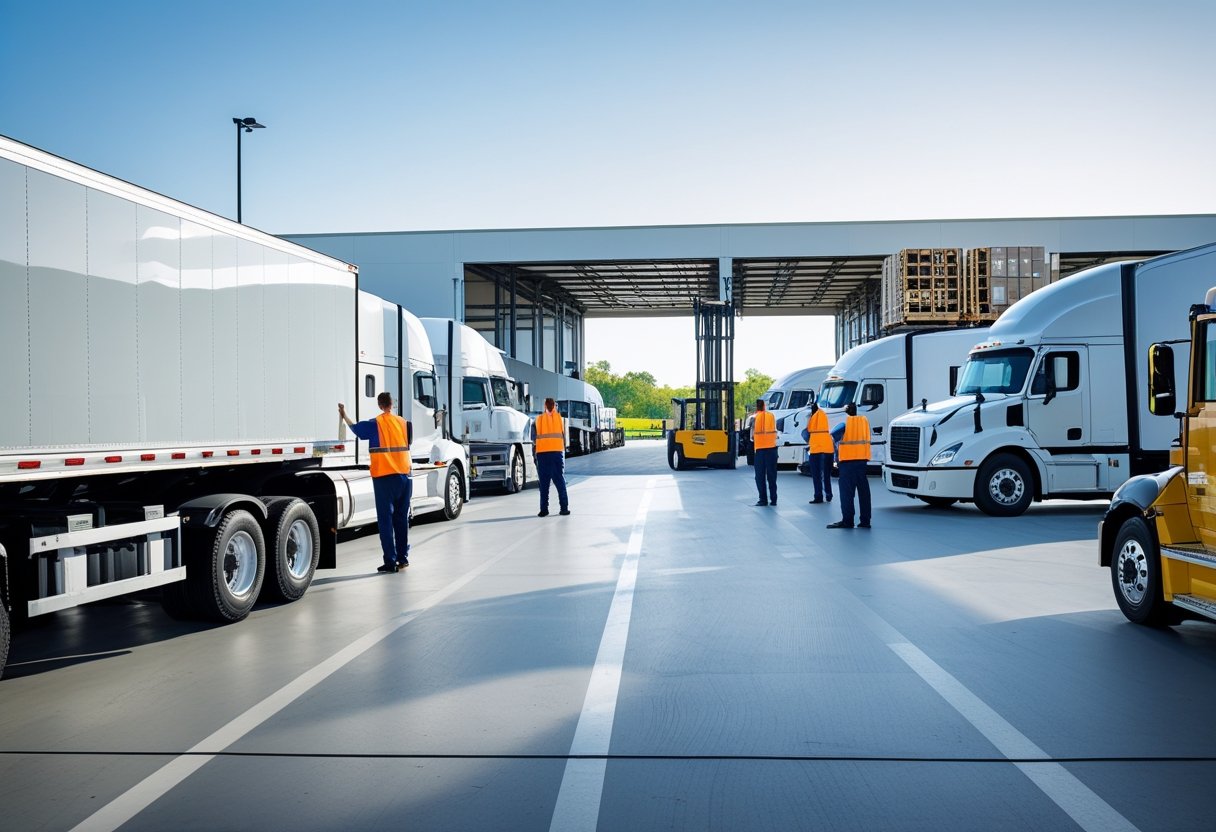Trucking and Logistics Company Driving Efficiency in Supply Chain Management
How to start saving money
Lorem ipsum dolor sit amet, consectetur adipiscing elit lobortis arcu enim urna adipiscing praesent velit viverra sit semper lorem eu cursus vel hendrerit elementum morbi curabitur etiam nibh justo, lorem aliquet donec sed sit mi dignissim at ante massa mattis.
- Neque sodales ut etiam sit amet nisl purus non tellus orci ac auctor
- Adipiscing elit ut aliquam purus sit amet viverra suspendisse potent
- Mauris commodo quis imperdiet massa tincidunt nunc pulvinar
- Excepteur sint occaecat cupidatat non proident sunt in culpa qui officia
Why it is important to start saving
Vitae congue eu consequat ac felis placerat vestibulum lectus mauris ultrices cursus sit amet dictum sit amet justo donec enim diam porttitor lacus luctus accumsan tortor posuere praesent tristique magna sit amet purus gravida quis blandit turpis.

How much money should I save?
At risus viverra adipiscing at in tellus integer feugiat nisl pretium fusce id velit ut tortor sagittis orci a scelerisque purus semper eget at lectus urna duis convallis. porta nibh venenatis cras sed felis eget neque laoreet suspendisse interdum consectetur libero id faucibus nisl donec pretium vulputate sapien nec sagittis aliquam nunc lobortis mattis aliquam faucibus purus in.
- Neque sodales ut etiam sit amet nisl purus non tellus orci ac auctor
- Adipiscing elit ut aliquam purus sit amet viverra suspendisse potenti
- Mauris commodo quis imperdiet massa tincidunt nunc pulvinar
- Adipiscing elit ut aliquam purus sit amet viverra suspendisse potenti
What percentege of my income should go to savings?
Nisi quis eleifend quam adipiscing vitae aliquet bibendum enim facilisis gravida neque. Velit euismod in pellentesque massa placerat volutpat lacus laoreet non curabitur gravida odio aenean sed adipiscing diam donec adipiscing tristique risus. amet est placerat in egestas erat imperdiet sed euismod nisi.
“Nisi quis eleifend quam adipiscing vitae aliquet bibendum enim facilisis gravida neque velit euismod in pellentesque”
Do you have any comments? Share them with us on social media
Eget lorem dolor sed viverra ipsum nunc aliquet bibendum felis donec et odio pellentesque diam volutpat commodo sed egestas aliquam sem fringilla ut morbi tincidunt augue interdum velit euismod eu tincidunt tortor aliquam nulla facilisi aenean sed adipiscing diam donec adipiscing ut lectus arcu bibendum at varius vel pharetra nibh venenatis cras sed felis eget.
A trucking and logistics company manages the movement of goods from one place to another. It ensures products get delivered on time and in good condition.
These companies handle transportation, warehousing, and distribution. They often offer services like truckload, less-than-truckload shipping, and freight forwarding.
They connect shippers with carriers and coordinate all parts of the supply chain.

A trucking and logistics company provides reliable and efficient shipping solutions that keep businesses running smoothly by managing freight shipping, storage, and delivery. Their role is crucial for industries that depend on moving large amounts of goods across regions or countries.
Such companies use specialized equipment, real-time monitoring, and flexible service options to meet shipping needs. Whether handling flatbed freight, heavy hauling, or warehousing services, they help reduce delays and streamline operations for their customers.
Understanding Trucking and Logistics Companies

Trucking and logistics companies handle key parts of moving goods. They manage transportation, storage, and coordination within the supply chain.
These companies serve different but connected roles. They support trade and delivery.
Core Functions and Services
Trucking companies focus on the physical transportation of goods by truck. They own or lease trucks and drivers who pick up, haul, and deliver freight.
They provide services like Full Truckload (FTL) or Less Than Truckload (LTL), depending on cargo size.
Logistics companies take a broader approach. They plan, manage, and coordinate all parts of the supply chain, including transportation, warehousing, and inventory.
Logistics firms may not own trucks but work with trucking companies or act as third-party logistics (3PL) providers to organize shipments.
Both types aim to reduce costs, improve delivery times, and ensure goods arrive safely. Logistics companies handle more strategy and management.
Role in the Supply Chain
Trucking companies act as carriers. They move products between suppliers, warehouses, and customers.
Their role is essential for the physical freight movement. Logistics companies oversee the entire supply chain process.
This includes route planning, inventory control, and freight coordination. They ensure every part of the transport and storage system works together.
By working with trucking firms and other carriers, logistics providers optimize supply chains. They handle paperwork and meet regulatory rules.
Industry Overview
Trucking and logistics play vital roles in trade. The trucking industry faces challenges like rising fuel costs, driver shortages, and strict regulations.
The logistics industry is growing due to increasing e-commerce and the need for faster, more complex supply chains. Many logistics companies now use technology for tracking and planning.
Some trucking logistics firms act as freight brokers, matching cargo with carriers. Others operate as full-service 3PLs, managing the transportation process.
Types of Trucking and Logistics Services

Trucking and logistics companies offer services tailored to different shipment needs. These services vary by load size, delivery urgency, and customer requirements.
Understanding these options helps businesses pick the best fit for their operations.
Full Truckload (FTL)
Full Truckload (FTL) service means the entire truck carries goods from one customer. It is used for large shipments or when a company wants exclusive use of the truck.
FTL offers faster transit since the truck doesn’t make stops to unload other shipments. This reduces handling risks.
It is ideal for bulky, heavy, or time-sensitive goods. Customers often choose FTL for high volumes or when they want direct routes.
Pricing is usually a flat rate per truck. This service suits industries like manufacturing, retail, and agriculture.
Less Than Truckload (LTL)
Less Than Truckload (LTL) shipping is for smaller freight that does not need an entire truck. Multiple customers’ shipments are combined in one vehicle.
LTL is cost-effective for companies with limited cargo. Deliveries take longer because trucks make multiple stops.
Risk of damage may be higher due to more handling. LTL shipments are billed by weight and freight class.
Businesses with moderate-sized loads or irregular shipping schedules use LTL to save money.
Dedicated Transportation
Dedicated transportation means a trucking company assigns specific trucks and drivers to one customer. The service matches the customer’s schedules and shipping needs.
This option provides consistent capacity and reliable delivery times. It helps companies manage frequent or sensitive shipments.
Dedicated transportation is common in retail, automotive, and food industries. It can improve efficiency by eliminating empty miles and improving route planning.
Freight Solutions and Shipping Options
Trucking and logistics companies offer various freight and shipping services to meet business needs. These services include managing shipments and arranging transportation.
Freight Brokerage
Freight brokers act as intermediaries between shippers and carriers. They connect businesses with trucking companies that can transport goods.
Brokers help find the best shipping options based on price, delivery time, and cargo type. They negotiate rates, track shipments, and handle paperwork.
Freight brokers can handle FTL, LTL, and intermodal transportation. Using a broker is useful for companies needing flexible shipping solutions.
Third-Party Logistics (3PL)
Third-Party Logistics providers manage a wide range of supply chain services. They handle warehousing, inventory management, and packaging.
A 3PL uses technology and logistics expertise to improve delivery speed and cut costs. They often work with multiple carriers and modes of transport.
3PLs help businesses scale operations without investing in trucks or warehouses.
Urgent and Specialized Delivery
Some shipments require quick or specialized handling, such as temperature-controlled goods or oversize cargo. Urgent delivery services use dedicated trucks or air freight to ensure on-time arrival.
Specialized delivery may include flatbed trucks for large equipment or refrigerated trailers for perishables. Logistics companies design transport plans for unique requirements.
This ensures products arrive safely and on time under strict conditions.
Warehousing and Distribution
Warehousing and distribution are vital parts of the supply chain. They involve managing stock, storing goods securely, and ensuring fast order processing.
Inventory Management
Effective inventory management tracks the quantity and location of goods within warehouses. It uses systems to update stock levels in real-time.
This helps prevent overstocking or running out of products. Companies often use warehouse management systems (WMS) for detailed inventory reports.
This allows for better planning and quick response to demand changes. Accurate inventory supports timely delivery and improves customer satisfaction.
Storage Capabilities
Storage capabilities show a company's ability to handle different types of products safely. Warehouses offer options like temperature-controlled areas and heavy-duty sections.
Space utilization is important to maximize storage capacity. Advanced facilities may include automated shelving and cross-docking services.
Security measures like surveillance and restricted access protect inventory.
Order Fulfillment
Order fulfillment involves picking, packing, and shipping products to customers. Efficient fulfillment reduces shipping errors and speeds delivery.
Trucking and logistics firms often integrate fulfillment with transportation planning. Some offer value-added services such as custom packaging or returns handling.
Clear communication and tracking tools keep customers informed during delivery.
Operational Excellence and Customer Focus
Operational excellence in trucking and logistics depends on clear standards and effective scheduling. Measuring performance through customer satisfaction is also important.
Customer Service Standards
Strong customer service starts with clear communication and transparency. Trucking and logistics companies set standards for timely updates and quick issue resolution.
Staff are trained to handle inquiries and provide accurate information. Consistency in service quality builds trust.
Companies use feedback systems to monitor customer experiences. Meeting delivery promises reduces complaints and improves relationships.
Using technology like tracking systems enhances visibility for customers. They can check shipment status in real time.
Scheduling and Efficiency
Efficient scheduling ensures trucks and drivers are used well. Advanced software helps assign loads based on delivery windows and route planning.
This reduces delays and fuel costs. Flexible schedules allow quick adjustments for traffic or weather.
Proper scheduling also supports driver well-being by managing hours. This promotes safety and reliability.
Performance and Satisfaction
Measuring performance involves tracking key metrics like on-time delivery and order accuracy. These indicators highlight areas for improvement.
Customer satisfaction surveys provide direct insight into service quality. Companies use this feedback to adjust processes.
Continuous improvement focuses on minimizing errors and streamlining workflows.
Innovations and Technology in Trucking and Logistics
Advances in technology have changed how trucking and logistics companies handle transportation and shipping. New tools improve planning, monitoring, and adapting to market demands.
These changes help companies move goods faster and more efficiently.
Transportation Management Systems
Transportation Management Systems (TMS) are software platforms that organize and optimize shipping operations. They help companies plan routes, schedule shipments, and manage carriers.
By automating these tasks, TMS reduces errors and lowers costs. Many systems now include features like load optimization and freight auditing.
These features enable better use of trucks and reduce wasted space. TMS also provide insight into delivery times and shipping expenses.
Using a TMS helps coordinate shipments smoothly across multiple modes and carriers.
Tracking and Visibility
Tracking technology allows companies to see where shipments are in real time. GPS devices and Internet of Things (IoT) sensors provide accurate location data and status updates.
This visibility reduces delays by spotting problems early. Real-time tracking improves communication between drivers, dispatchers, and customers.
It also supports predictive maintenance by alerting when trucks need repairs. This reduces downtime.
Tracking systems increase transparency in the shipping process. Customers and businesses can trust that goods are handled properly and follow the scheduled route.
Industry Trends
The trucking and logistics industry continues to adopt technologies that increase efficiency and reduce environmental impact. Electric vehicles and alternative fuels are becoming more common in fleets.
These options help lower emissions and fuel costs. Artificial intelligence (AI) is being used to analyze large data sets for better decision-making.
AI helps forecast demand, optimize routes, and manage inventory. Collaborative networks between companies enable shared resources and information.
Platooning, where trucks travel closely in groups using automated driving systems, is growing. This technology improves fuel efficiency and driver safety on highways.
TrendsBenefitsExamplesElectric vehiclesLower emissions and fuel useBattery-powered trucksAI and Big DataBetter planning and forecastingDemand prediction and routingPlatooningFuel savings and safetyAutomated convoy drivingIoT and SensorsReal-time tracking and statusFleet monitoring and maintenance



